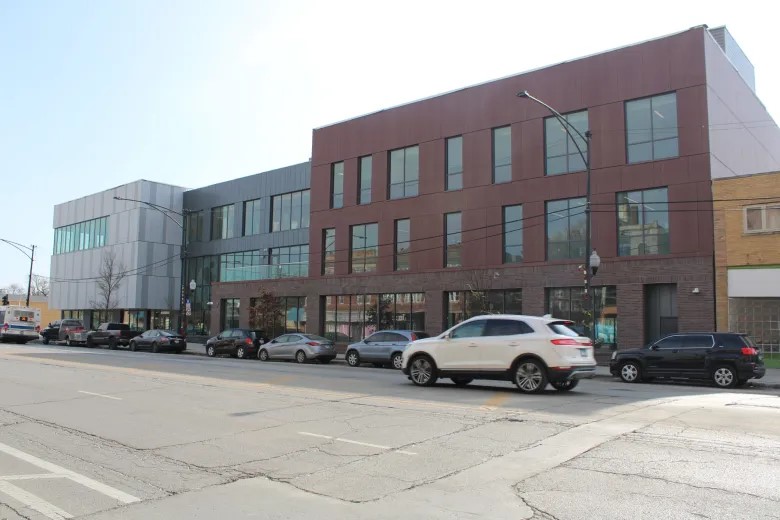After Aldi Closed In A Food Desert, West Side Groups Give Groceries To Neighbors — But Permanent Food Access Is Needed, They Say

WEST GARFIELD PARK — Madeline Martin, 62, used to go every morning to the Aldi at 3835 W. Madison St.
The short walk from Martin’s West Garfield Park home made carrying groceries back easy, and prices were affordable. Each morning she’d pick up, “my coffee, bread, cereal, milk for my grandbaby and just the basic needs that I need.”
But the store abruptly closed in early October, leaving Martin without a convenient place to get fresh food.
“I was so disappointed. When I seen that they were moving stuff out, I thought they were going to remodel it or something. But no, [it] was closing permanently. And I’m left wondering why,” Martin said. “This is the neighborhood grocery. And it’s been missed.”
On Saturday morning, Martin was among those who returned to the closed store’s parking lot as community organizations provided food to 250 residents. Many of the people picking up food were older and live at one of four senior centers within a block of the closed Aldi.

Essie Brown picked up the last two bags of food — filled with a whole frozen chicken, ground beef, rice, bread, celery, lettuce, apples, oranges, carrots, spinach and one big pineapple — and hooked it to the back of her electric wheelchair.
Brown routinely picks up groceries for neighbors at her senior home. Not having Aldi has made the task harder, she said, as West Garfield Park now has only one grocery store: a Save-A-Lot at 420 S. Pulaski Road.
“Some people can’t go down there,” Brown said. “It’s a lot of senior citizens around here [who] can’t get out. They don’t have no way of getting out. … No way to get food. It’s a big problem.”
Organizers said Saturday’s “emergency food distribution” is only a short-term Band-Aid to an urgent problem: There is a food desert in West Garfield Park.
“There’s a strategic starvation on the West Side of Chicago,” said Mercedes Pickett, founder of local nonprofit Earth’s Remedies, which partnered with Garfield Park Rite to Wellness Collaborative, West Side United and Rush University Medical Center to give away food. “Some individuals don’t have access to transportation. Walking out of their homes to an affordable, healthy option is key. Aldi’s was that.”
An Aldi spokesperson told Block Club in late October the store was closed due to “consistently declining sales and the fact that we’ve operated this location at a loss for several years.”
Neighbors said the move left them in the dark.
“It was without any communication to the community about their plan to leave,” said T.J. Crawford, executive director of Garfield Park Rite to Wellness Collaborative. “While we haven’t planned for this, we are responding because it’s necessary.”

Crawford said the emergency food distribution was sparked by community members rallying Oct. 29 outside Aldi’s headquarters. They want a new grocery store to take over.
Crawford said Aldi representatives have “stonewalled” his communications and local leaders “have not responded in a real way.”
“We want to get this building now. Get a community-centered and -endorsed grocer that will provide the food and service that Garfield Park community deserves,” Crawford said. “Food is medicine. Food is a key component to good health.”
David Ansell, senior vice president for community health equity at Rush, said food deserts on the West Side are driven by structural inequality and systemic racism. Ansell, author of “The Death Gap,” said life expectancy is 14 years shorter for residents of the area than for people living in the Loop.
“You would never turn the electricity off in the community, you would never stop pumping water. Fresh food can be the difference between life and death,” Ansell said. “When you have a multinational corporation sneak out in the middle of the night and stop a lifeline to a community — it’s an act of violence.”
The emergency food distribution will continue Fridays or Saturdays for at least the next six weeks, said Rachel Smith, program director for social work and community health at Rush University Medical Center.
“I think it’s really important for people to see, when you shutter something that’s so vital to the community, the ripples and the shockwaves are immediate. And that’s what you’ll see with this line of individuals here to pick up food,” Smith said. “If people don’t have the right resources in one community, if it could happen here, it could happen anywhere across the city.”
The 250 food bags were gone in less than two hours Saturday. Martin was grateful to get the food — but dearly misses her favorite store.
“I thank God for the community, for the people feeding the community. Because there’s a lot of people that’s hungry,” Martin said, raising her grocery bag. “And this here, this will help out a whole lot of families.”




